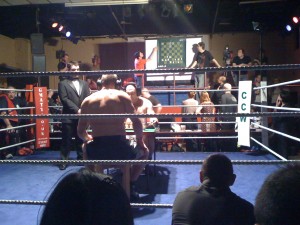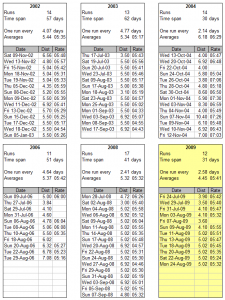Okay, so we don’t really do Halloween in Australia or in Ecuador, but they do in America and that’s excuse enough for Dani to pull out the big guns:
Email fixed
My main email address has been nerfed for the last day or so. If you tried to contact me, you may have gotten a “mailbox full” error. It’s fixed now.
Chess boxing
Dani and I went to watch the European Heavyweight championship fight for chess boxing last friday. Yes, chess boxing. In case you don’t know it, chess boxing combines speed chess with boxing, alternating four minutes of chess with three-minute rounds of boxing. The winner is determined by checkmate, knockout, the opposition running out of time in the chess (each competitor gets 12 minutes in total) or, in the unlikely event of no result by the end of the sixth and final chess round, by points from the five rounds of boxing.
There were three matches in the evening, but the main event was between these two freakin’ mountains of men (click on the image for the full-sized version. My apologies for the poor image quality – I forgot the camera and was reduced to using my phone):
As you can see, during the chess rounds the competitors have earphones on (and cotton wool stuffed in their ears) to avoid distraction from the crowd and to allow a commentator to talk about the game. The old-school board in the background was used because the projector gave up the ghost half-way through the night.
The event got coverage from The Times, The Independent and The Telegraph, although the Times correspondant (or her management?) seems to have been a little caught up with the “glistening muscles.”
We had a great time. I was amazed at how well the guys were playing in their chess despite being repeatedly pummelled about the head.
Forever starting
I am a chronic starter. It seems that every week or two I start something new. This would be great, if only I then kept doing whatever it is that I start.
One of the things that I start doing on a regular basis is running. Just about every year, usually about half-way through summer, I start running again. Every year I keep a careful log of what I do, every year I try not to build up too quickly, every year I become tremendously enthusiastic, every year I dream of completing the London Marathon and every year, without fail, I stop running after a month and a half.
(Click on the image for a bigger version. Distances are in kilometres; rates are min/km)
I used to be a runner. Back in 1992, my final year of high school, I ran four times a week on top of two weekly sessions of soccer training in the winter and cricket in the summer. In the middle of that year I ran the Gold Coast Half-Marathon in 1:38:37 (4 min 40 sec per kilometre). Later that year I ran a cross-country 8km in 32 minutes flat. I was in the Queensland junior orienteering team.
I’ve always thought of myself as a runner (well, okay, a lapsed runner). I’ve blamed everything I could imagine for my repeated failure to get into a habit again. Diet. Running too far. Running too quickly. Not enough time to rest between runs. Too much time between runs. Not running on the same days of the week. Insufficient variety in my routes. Not running with music. Not running enough with other people.
I generally hold that with exercise (hell, with anything), what propels you forward is novelty in the short term, discipline in the medium term and habit in the long term. The trick, then, is to find a way to deal with a chronic lack of self-discipline in the medium term when you’ve ruled out options like joining the military to have discipline imposed upon you.
Here’s an email I sent to some of my friends last year (21 Aug 2008):
It’s not that I get bored with the runs when I’m on them – I tend to vary my courses and occasionally run with a club. As far as I can tell, I just get to a point where I can’t be arsed going today, tell myself I’ll go tomorrow, end up only going in three or four days and then repeat the process with the lags becoming longer until I just forget about it altogether. I have tended to get quite tired after the first couple of weeks, which suggests that an inappropriate diet might be the cause, but I’m hesitant to use that as the explanation when the phrase “I’m a lazy bastard” is swimming gently across my forebrain. There’s also the possibility that I rapidly envisage absurdly ambitious goals when I first start and manage to discourage myself before I’ve even built the habit of running.
So. I’m looking for suggestions on how to keep it going this time. I’ve managed nine runs so far and all pretty evenly spaced (see attached). The 5km runs are on the Heath, the 7km runs are with a running club of 80+ people around Hyde Park and Kensington Gardens. Runs on the Heath are infinitely variable. I don’t start back at uni for six weeks and have no work planned, so it’s a perfect opportunity to build up a weekly ritual.
My friend Chris replied (22 Aug 2008) with:
My most successful tactic: grinding down the barriers of participation.
The thing that makes it hard to run is NOT the running. It’s the transition from comfort and inertia to physical discomfort and effort (usually in the dark and cold in England). You have to look at what you need to achieve: in the first few months you are trying to achieve a HABIT. Nothing else. You’re not trying to achieve physical fitness, training, distance or anything else.
So looking at it as habit training, the best thing you can do is work on the habit above all else. It doesn’t matter a toad’s cloaca whether you go out and run 12k or 400 metres, if you stop a fortnight later. And as you know, stopping is never a decision to stop running. It’s a decision to take tonight off and go tomorrow instead. Then tomorrow. Then tomorrow…
The only way to succeed is to form the habit above all else, and the only workable way to form the habit is to make the habit easy. So, change your goal. It’s not to go for a run, it’s to put your tights on and step outside the door. Make THAT what you do 3 times/week (or better, every Tues, Thurs and Sunday, since “3/week” gives you wiggle room).
So 3 times a week you will put your shoes and silver bodysuit on, and walk to the gate. What happens then is purely a matter of how you’re feeling at the time. Until you are standing at the gate, you are not planning anything else.
Pound down the delta between what you are doing now (vegging in a warm lounge room) and what you will be doing in 10 minutes (standing outside your door). Smash the crap out of that delta, because that’s your only enemy.
Which is eminently sensible advice, but as you’ll see above in the image, I stopped running two weeks later. There was something missing.
Another friend, Anthony, also suggested last year that I
drop down a lot of cash on an event, such as Noosa Tri, which gives [you] some financial and pride incentives not to look like a fat unfit bastard on the day.
Again, excellent advice, but unless I have a basic belief that even with no training at all I can still cough and wheeze my way around the course, there’s a fair chance that if it’s all seeming a bit too hard I’ll just give up and call the cash gone. However, it does lead into the classic economist’s way of solving any problem: financial incentives. In January 2008, Ian Ayres, Jordan Goldberg and Dean Karlan (two of them economists) lauched stickK.com. It’s a site that will let you set up a contract on yourself (e.g. to lose weight). If you don’t meet the terms of the contract, you forfeit money.
I think it’s a neat idea, but it’s never really sat well with me. If your money is potentially going to a charity that you hate, then that’s just stupid. If it’s going to a charity that you like, then your incentives are all screwed up. So instead, I’ve decided on a different idea:
As soon as I finish writing this post, I’m going to go to the bank and withdraw £520. I will then divide it across eight envelopes and give them all to a good friend, Dimitri, with strict instructions to return the money back to me piecemeal as he is satisfied that I have gone for a run. The amounts returned will be increasing over time, so the first run will get me £30 back, the second £40 and so on up to the eighth run being worth £100. There will be a time limit of three weeks on my claiming the money back and a limit of no more than four runs being claimed per week. Here are the benefits, as I see them:
- Dimitri is a good friend and I trust him not to run off with my money.
- If I don’t meet the requirements, I also trust Dimitri to not turn Good Bloke and give me the money back anyway.
- He is pretty fit at the moment, having just competed in the London Triathlon, and is training regularly himself.
- It’ll be up to Dimitri to judge whether he believes me when I say I went for a run.
- The total amount of money is large enough that I will really want to get it back.
- The incentive is increasing over time, so I won’t be tempted to just go for a couple of runs and call it quits.
- The overall time limit combined with the restriction of no more than four runs per week will make sure that I don’t put it off and that I don’t end up hurting myself.
- Possibly most importantly of all, it extends the period of novelty well into the period that would otherwise be solely governed by (a lack of) discipline.
Eight more runs will take me to 20 in total. If it goes well and Dimitri is willing, I might then repeat the process. After that, I should hopefully have been running for long enough that I can get myself out the door without the financial incentive.
Note to self…
When ordering a latte from a British caff, remember that their unit of measure for barista-applied sugar is much larger than the little packets you get at specialist coffee shops.
Playing cricket in England
On Saturday night, just before midnight, Daniela and I were roped into playing a game of cricket on Sunday for a team of ex-pats. Well … “roped” is the wrong word and much too unfair: we signed up with enthusiasm. No, that’s not quite right, either. Dani gets incredibly excited by this sort of random adventure and she signed up with genuine enthusiasm. It was inevitable at that point that I sign up as well (with Australia levelling the Ashes up in Leeds, I did have a patriotic duty to join the fray), but my enthusiasm was buoyed somewhat by the wine and had a slightly greasy patina of apprehension. I hadn’t played a proper game since October 1992 when I was in my high school team and Dani had only played a couple of games of backyard cricket with the dog chasing the ball. Still, we were assured that experience and ability were by no means necessary, so we agreed con gusto.
We only got to bed at 3am on Sunday (it was a big night – a friend was leaving London), but managed to wake in time to gather with the rest of the team in central London at 11:30am, coffee in hand. To the casual eye, my whites may have looked a bit like an old pair of khakis supplemented with a borrowed white polo shirt. Dani, of course, was resplendent in white from top to bottom. The team we played for represents a charity and, it turns out, there are charities that offer transportation services to other charities, so we all piled into the mini-bus more usually used for carrying disabled children to be driven for an hour and a half to the interminable maze otherwise known as the Oxfordshire countryside.
We must have spent 40 minutes twisting and turning and silently swearing at the perpetually manic directions of the lady in the SatNav (“Recalculating. After point four miles, turn left, then turn left.”). I was sitting next to our captain – an Indian chap with an easy grin who was about to submit his Ph.D. He alternated between trying to figure out where we were, pouring scorn on the English badminton team for pulling out of the world championships in India and declaring confidently that, as an Australian, I must be a fantastic fielder who would happily throw himself horizontal to stop a boundary. I mumbled something about a bit of practice in the nets before the match and stared anxiously at the six-foot hedges.

We eventually found the Ipsden Cricket Club [Google Maps]. It’s a beautiful ground that backs onto a (recently harvested) wheat field and has a gigantic ash (?) tree down on the long boundary at the western end. The pavilion even has a piece of the original floorboards of the Long Room at Lord’s. The weather was superb, with barely a cloud and a fair breeze coming from the north west. I guess that the temperature would have been in the mid-twenties (Celsius). There were some Red Kites in the sky and quite a few gliders were out for the day.
A couple of the guys padded up and we took turns bowling in the nets. I somehow managed to keep mine in the general direction of the stumps, managed a few yorkers and even clean bowled one of our batsman once. The captain told me that I would bowl in the match and our friend that had invited us expressed some joy that he wouldn’t have to be bowler number five all on his own. I started to pick up some confidence. It was fun. It was relaxed. I didn’t suck.
The game was to be 35 overs each; we fielded first. The Canadian on our team used to play as a catcher in baseball and became the wicket keeper. Dani alternated between Third man and Long on, while I swapped between Point and Mid-wicket. We had two good bowlers, two pretty-good bowlers, and me and my mate who’d invited us. We did pretty well in the first 10 or 11 overs. We got a couple of wickets and they weren’t scoring too quickly (maybe four per over?). I didn’t fumble my first couple of touches of the ball and Dani was enjoying herself.
Then I missed a ball badly. I froze, didn’t get down to it and had to run swearing after the thing only to watch it dribble over the boundary. Not to worry, it was only one mistake and other people were occasionally missing some too. After a couple more overs I was called up to bowl. I was okay in my first over: clearly nervous and not very good, but not obscenely bad either. My second over, however, was a shambles that in hindsight I’m almost oddly proud of. It was chaotic, occasionally dangerous to the batsman and very, very expensive. I was “rested” after that.
My second over also roughly marked the start of our mini collapse. Without a fifth bowler, our two decent guys had to bowl 11 or 12 overs each (the Ipsden team very kindly waived the rule requiring no more than seven overs per bowler) and they started to get tired. I was fading mentally pretty quickly and I missed four or five balls in what turned into a pretty farcical fielding display. I even managed to have my feet slip out from under me on one occasion. Drinks came out after 21 overs and our captain took the time to observe that we were fielding atrociously.
By that point the batsmen had settled in nicely, though and our fielding was rarely the problem. Boundaries, boundaries, everywhere became the order of the day. Poor Dani had to scramble down the embankment past the boundary to hunt for the ball in the bracken on more than one occasion. I was out at Deep cover point and Deep forward leg by then and under instruction to stay on the boundary (not walk in with the bowler). I may not have had the reflexes for the infield, but dammit, I could run around like a mad hare as sweeper. For the last five overs or so, I switched over to the northern side of the field and played Square leg and Deep cover. I managed to stop the three or four balls that came to me, saving a couple of singles and a boundary, so my fielding ended, if not a high note, then at least having recovered a smidgen of self-confidence. Ipsden managed 3 for 236 after 35 overs, with one chap on 101 not out. It had taken three and a half hours.
Our hosts put on quite a spread for the break. Half a dozen types of sandwiches, some chips (“crisps” to the English) and a bunch of delicious sweet tarts and teacakes filled us up mightily with endless cups of tea. The black labrador of the club president happily wandered between us, soaking up the attention. I reminded Dani how to hold the bat (it’s not a natural position for someone new to the game) and we both earnestly hoped that we wouldn’t need to pad up.
Dani’s and my friend opened the batting along with the captain and it shortly became clear that the race was on. I was surprised. Apparantly last year the Ipsden team had gotten our lot all out for only 60. Dani and I ended up sitting and watching a fine batting display as our batters clipped along to seal the win with two balls and six wickets to spare. One of our lads managed a fantastic century and another 74. The sun had started to set by the end and the wind, still fresh, began to chill a little. Jumpers, cups of tea and the dog to the rescue, we were toasty warm through to the end.
It was the last game for our captain, who on top of the win to remember was presented with a bottle of champagne and a first-edition copy of C.L.R. James’s classic, “Beyond a boundary“, by the regular members of the team. We got back to London about 9:30pm and were home by 10. It was an absolutely cracking day. We really enjoyed ourselves and the team was a great bunch of guys. It was, in many ways, the very best sort of day in England.
Now if only I weren’t so stiff the day after that I can barely walk …
Gratuitous self-promotion
I’ve removed my research page from this site and properly updated my LSE site.
Culinary delights of Washington, D.C.
Half the reason for our recent trip to America was to visit friends in D.C. Photos for our gallery or facebook will have to wait until Dani gets back, but I thought I’d share a few thoughts on eating in Washington:
- Tyler Cowen knows what he’s talking about. The complete version of his dining guide in a single page is here.
- I ate buffalo (okay, okay. “american bison”) for the first and second time. The first was in the wonderfully thought out food hall of the National Museum of the American Indian. The second was in the form of a burger on the rooftop terrace of one of our friends. Good times.
- The cupcakes at Georgetown Cupcake are delicious (and well worth the wait in line), but they’re not quite as good as those from the Primrose Bakery here in London.
- The sandwiches at Dean & DeLuca are pretty damn fine.
- The burgers at Ray’s Hell Burger (how do they not have their own website?) are utterly incredible. I can have my burger au poivre? With Foie Gras? My mouth is watering just remembering it.
- Be careful that the Ethopian restaurant you choose doesn’t slap you with $6 + tax + tip cokes (it was in the fine print of the menu). Nevertheless, you’d be crazy to miss some Ethopian while you were there.
- The crab cakes in Annapolis, MD are the perfect excuse for a day trip.
- But hands down, the best food I had in D.C. — our friend Maria’s pasta aside, of course — was at Thai X-ing. It is one guy in the basement of a house. It’s freaking tiny and easily the best Thai food I have ever, ever eaten. Here are two photos that I took on my phone (Click on each for a bigger version. I apologise for the poor quality – the iPhone 3G only has a 1 megapixel camera and the receptor is hardly impressive):

We somehow managed to fit eight people in the space behind Dani and Maria (the bird cage was moved). The cooking is really slow, so the thing to do is to place your order the day before you go if you’re going to eat there. Unbelievably cheap. I refuse to recommend a single dish.
Culinary delights of Atlanta, GA
I’ve recently returned from America where, among other things, Dani and I went to the wedding of two of our best friends. On the day of the wedding, the groom’s uncle continued a family tradition by taking the groom and 30 or 40 of his closest male kith and kin out to lunch. While there I had the great pleasure of encountering a new (to me) Southern dish:
A quite spicy (but not obscenely so) Jalepeno pepper, stuffed with shrimp, wrapped in bacon and deep fried on a stick.
I managed three, but should probably have stopped at two. Fantastic. I only wish I’d had the sense to take a photograph.
Integrating with Twitter
I’m not really sure about Twitter. I don’t really see the point. I guess the mobile-phone integration is a step forward, but still …
Anyway, I’ve just installed Twitter Tools so that my Twitter account will get an update when I post a new entry here on my blog.





